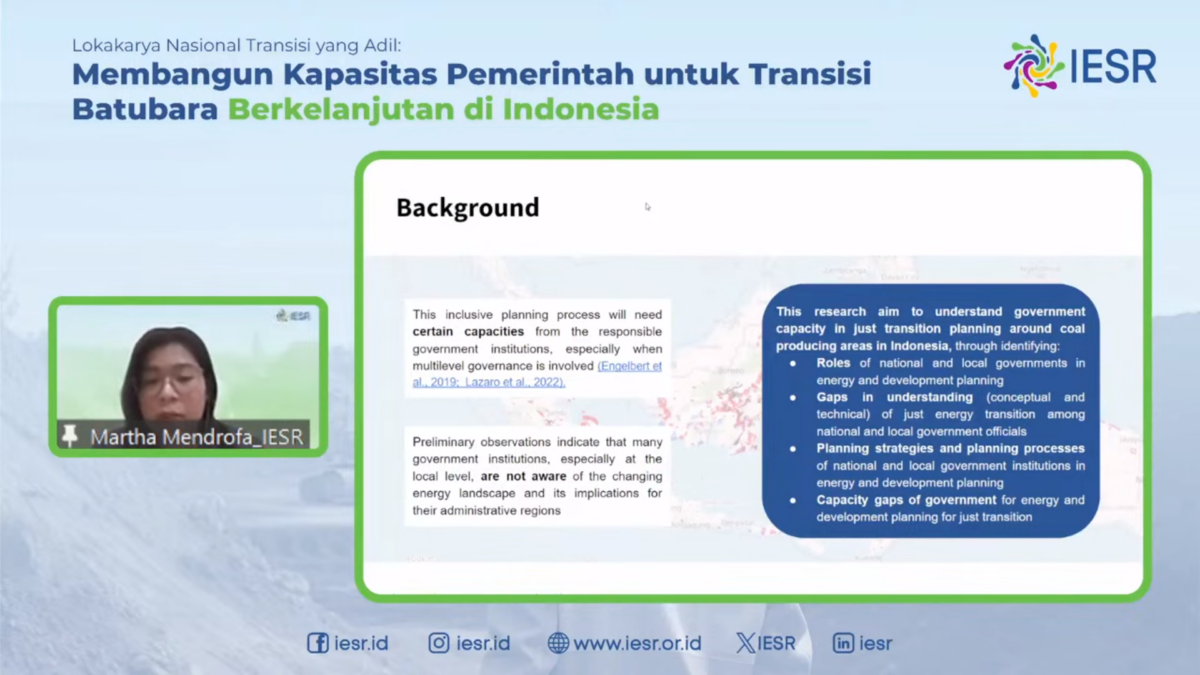Jakarta, 26 October 2023 – The energy transition currently being discussed will have a significant impact on the use of fossil fuels such as coal. Various countries have committed to reducing the use of fossil fuels as one of the key actions in their energy transition. Fossil producing countries such as Indonesia need to be aware of this, because there will be a decrease in demand from the global market.
South Sumatra and East Kalimantan are the largest coal producing areas in Indonesia. Coal has become a key component in the economic growth of both provinces. In 2022, coal will contribute 30-35% to East Kalimantan’s GRDP and 15% in South Sumatra. These two provinces need a special strategy to get rid of economic dependence on coal. Stefan Boessner, a researcher at the Stockholm Environmental Institute (SEI) in the “National Workshop on a Just Transition: Building Government Capacity for a Sustainable Coal Transition in Indonesia” said that economic alternatives are available and can be developed.
“There have been examples of a region successfully diversifying its economy. The government will need capacity building support from the central government,” he said.
Stefan added that the Indonesian government has started to create a policy framework that will become the legal basis for the energy transition in Indonesia, such as a net zero emission target, regulations on the economic value of carbon, as well as a roadmap for early retirement for coal-fired power plants.
In preparing for this transition, development, economic and energy planning are very important. Involvement of various elements that will be affected by the transition become crucial.
Martha Jessica, Social and Economic Analyst at the Institute for Essential Services Reform (IESR) explained that one of the initial findings of the study currently being conducted by IESR is that there is a capacity gap between the central government and regional governments so that this transition planning is not considered optimal.
“To have a proper planning process, various superior/adequate capacities are needed by the government as the initiator (early actor) and catalyst of the energy transition,” said Martha.
Elisa Arond, SEI researcher, added that regional governments can play a crucial role in supporting a just transition agenda. To do all this, of course local governments will need a certain amount of support from the central government.
“They (sub-national governments-ed) need financial support from both the central government and international institutions, inclusive dialogue involving actors with diverse backgrounds, funding strategies, and transparent access to information about mine closure plans,” explained Elisa.
Tavip Rubiyanto, Associate Expert Policy Analyst as Coordinator of Energy and Mineral Resources, Directorate General of Regional Development, Ministry of Home Affairs, explained why currently the energy transition is not yet underway in the regions because regional authority is still limited.
“For this reason, the Ministry of Home Affairs has initiated the preparation of Presidential Decree no. 11 of 2023 to strengthen regional authority in carrying out government affairs in the ESDM sector, especially in the renewable energy sub-sector,” he said.
Brilian Faisal, representative of the South Sumatra Province Planning Office Bappeda, expressed the hope that the concept of a just energy transition must be related to access and infrastructure.
“In our regions we have not yet made derivative regulations from various regulations related to the energy transition because to make them we need to revise the RUED, which most of the authority is mostly in the MEMR sector,” said Brilian.
Wira Agung Swadana, IESR Green Economy Program Manager stated that this workshop was the right moment to prepare the RPJMN and RPJMD which must include the coal transition agenda.
“This transition requires several things such as planning and funding and must be included in the regional development agenda so that it can receive funding from the government,” said Wira.

